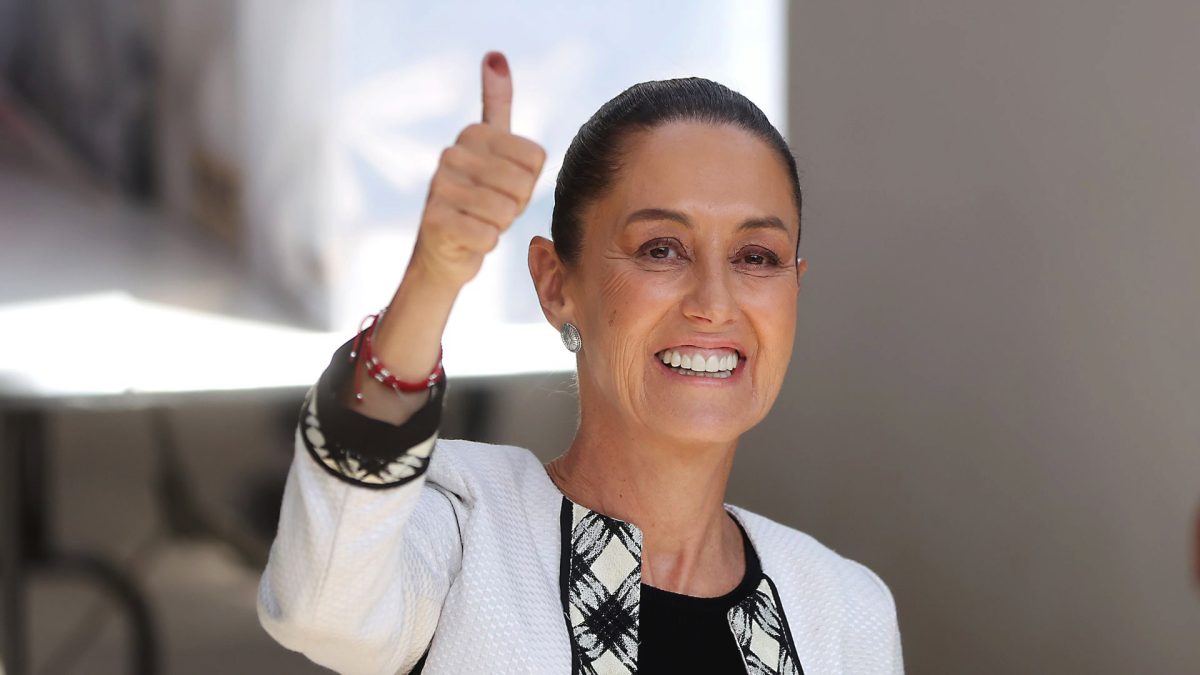MEXICO CITY, (Reuters) – Claudia Sheinbaum basked in the glow of a thumping presidential win late Sunday, thanking supporters who gathered at the capital’s iconic Zocalo plaza shortly after 1 a.m. to applaud Mexico’s first female president.
For months, the physicist-turned-Mexico City mayor was the clear frontrunner in the contest to succeed popular outgoing President Andres Manuel Lopez Obrador, her mentor and principle political benefactor over nearly a quarter century.
Sheinbaum now faces the task of forging her own path, including the delicate balancing act of advancing the leftist Lopez Obrador’s state-centric economic polices, especially over natural resources such as oil and minerals, while also making progress on issues seen as his weak points like the environment and crime.
The standard-bearer of the ruling MORENA party will also face a ballooning budget deficit, complicating her own spending plans.
Preliminary results from the INE electoral authority showed Sheinbaum leading her main opposition rival, Xochitl Galvez, by about 60% to 28%.
“I’m emotional and I feel grateful,” said the 61-year-old, who will also make history as the first president of Jewish heritage to lead the overwhelmingly Roman Catholic country.
“And I won’t let you down,” she added with a broad smile.
Sheinbaum’s triumph caps an unlikely four-decade climb that has taken the daughter of activist academics to the pinnacle of power in the Spanish-speaking world’s most populous nation, for decades known as a socially conservative bastion with a macho culture.
“It took way too many years to get here,” said Francisco Labastida, a veteran Mexican politician with the once-dominant Institutional Revolutionary Party, or PRI, who was the presidential runner-up in 2000.
Labastida said he was especially proud that Mexico had achieved the feat before its northern neighbor, the United States, which has never had a woman president.
Sheinbaum’s ability to separate herself from Lopez Obrador once she takes office in October is “the great unknown,” added Labastida, since the famously stubborn leader would likely try to impose his own vision despite his pledge to retire to his ranch in tropical southern Mexico.
The makeup of the new Congress will also be crucial, with MORENA and its allies securing a two-thirds majority in the lower house, while their seats in the Senate appear to be just shy of the threshold needed to amend the constitution unopposed, according to the latest INE results.
Both Sheinbaum and Lopez Obrador have proposed controversial reforms, such as a possible overhaul to the judiciary with Supreme Court judges elected by popular vote, which would require a two-thirds majority to enact.
Six years ago, Sheinbaum made history as Mexico City’s first elected woman mayor. Until she stepped down last year to run for president, Sheinbaum was known as a data-driven manager, winning plaudits for reducing the megacity’s homicide rate by half, by boosting security spending on an expanded police force with higher salaries.
She has pledged to replicate the strategy across Mexico, where powerful drug cartels exert widespread influence.
But Sheinbaum will be confronted with a wide budget deficit, which is set to end 2024 at nearly 6% of gross domestic product, according to the International Monetary Fund.
The incoming leader nonetheless has pledged to build on Lopez Obrador’s social spending largesse, which has included expanded old-age pensions and youth scholarships.
While she has expressed an interest in attracting private investment to grow renewable energy projects, she has also pledged to ensure the dominance of Mexico’s state-owned oil and power companies while swearing off any privatizations.
In 1995, Sheinbaum earned her doctorate in energy engineering from the National Autonomous University of Mexico, and then pursued a teaching and academic career, including a stint on the U.N.’s Intergovernmental Panel on Climate Change, which later shared a Nobel Peace Prize with former U.S. Vice President Al Gore.
She launched her political career in 2000, when Lopez Obrador, then-Mexico City’s newly elected mayor, tapped her to be his environmental chief, tasked with improving the smoggy capital’s air quality, highways and public transport.
Sheinbaum served as the chief spokesperson for Lopez Obrador’s first campaign for president in 2006, which he narrowly lost.
In 2015, she was elected to run Mexico City’s largest borough, Tlalpan, and became the capital’s mayor three years later, the same year her mentor’s third bid for the presidency ended in a landslide victory.
Paula Sofia Vazquez, a Mexico City-based political analyst, suggested that Sheinbaum’s command over the country’s military would provide an early test, since Lopez Obrador has greatly expanded the remit of the armed forces to key economic policies including major transport and building projects.
“It seems to me that’s a challenge no male president would face,” she said, arguing that the military’s culture can tend toward misogyny.
Vazquez singled out at least one more factor that would likely make Sheinbaum’s job even harder.
“Empathy is required from women. Women are required to have a certain sensitivity towards problems that men are not required to have,” she said. “Results are demanded from men, while women are required to show results but also a human touch.”






